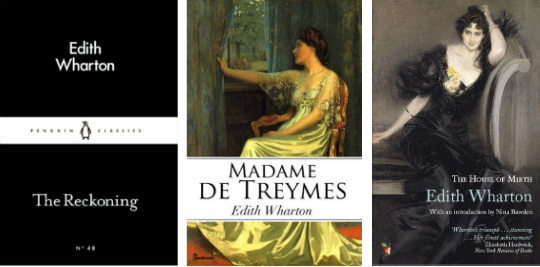re:View – The 2016 Bookshelf
April: The World of Edith Wharton
My reading progress this year continues to be irritatingly slow, but I’ve been working loads as well as making major life changes, so there just wasn’t enough time. And as always in difficult times, I turned to the comfort of Edith Wharton’s brilliant, beautiful writing.

The Reckoning by Edith Wharton
This is a little Penguin Little Black Classic that includes two of Wharton’s short stories on the topic of marriage. Mrs Manstey’s View is a short but deeply moving glimpse into the life of a lonely widow that shines with vivid descriptions of New York as seen through the lady’s window. I honestly believe nobody has even described the flowering of a magnolia tree more beautifully than Wharton does in this story. The Reckoning is a moral tale – I would argue – about an unconventional marriage and the dangers of double standards. I found this one a bit uncharacteristic for Wharton, given that she always took a very liberal view on marriage – certainly for her time – and in this story almost seems to backtrack on her ideals. However, as always, she looks deep into the human heart and writes with captivating urgency about the emotional stages we go through when a relationship falls apart.
Pens: 3 out of 5
Madame de Treymes by Edith Wharton
Where American high society meets French aristocracy, two very different worlds collide. In this 1907 novella about messy divorce, Wharton explores the differences between old Europe and the new world, and the social and moral codes governing the inhabitants of each. As many of Wharton’s stories, this plays out in an awkward social dance, where your entire future may be at stake because of who you can and can’t talk to, and the things that are or aren’t proper to say. As always, I love how delicately each bit of dialogue is woven, hiding and disguising so many layers of meaning, and I’m absolutely baffled at the thought that this was indeed a normal way of conduct for a group of people at a point in time. The suffocating restrictiveness of this society – the same concept that made The House of Mirth such a memorable read for me may years ago and introduced me to Wharton’s brilliant way of commenting on her own social order – again comes through very strongly in this novella, making it every bit as compelling as the more complex and famous but very similar Age of Innocence. In fact, it makes me want to go right back and re-read The House of Mirth all over again – but that’s only for about the tenth time, so I guess that’s fine.
Pens: 5 out of 5
The House of Mirth by Edith Wharton
This is my favourite book of all time and I’ve read it so many times that I can pretty much quote full paragrphs from memory. I first read it when I was 17 and it opened up my eyes to the concept of feminism (not something they used to teach a lot to teenagers in 1990s/2000s Catholic-conservative Bavaria…), then I wrote a 35-page essay on it for my English A-levels finals, with the help of a brilliant teacher who supported my budding interest in both literature and feminism, and eventually I ended up studying English – all on the back of this book. I guess you could call it a life changer. I still don’t know what it is about this book – which essentially traces the the rise and fall of Lily Bart in a relentless social microcosm – that captivates me so much. I’ve read dozens of similar stories from the same era and none of them touched me nearly as much, but to me this is just the most beautifully crafted satirical and feminist inside commentary by Wharton (who was decades ahead of her time) on the cruel, hypocritical and utterly ridiculous workings of her own social order. Despite the devastating downward trajectory of Lily’s story, there’s a lightness to Wharton’s writing, a delicate sense of humour, that I find incredibly comforting. It’s the feeling of being hugged by a beautifully written sentence; the absolute best thing a book can ever do for you.
